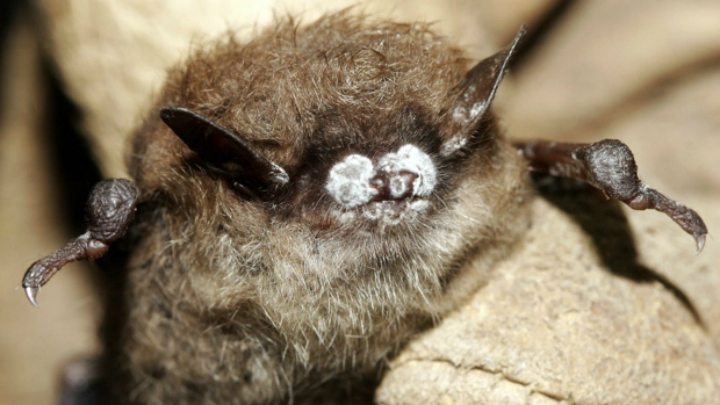

White nose syndrome is fatal to most of the bats exposed to it. (Ryan von Linden/New York Department of Environmental Conservation/AP). Courtesy of the CBC.
The provincial government is taking a proactive approach to fighting a deadly fungus that has already killed millions of bats across the continent.
Provincial funding to combat white-nose syndrome will be increased by more than $40,000. Ravi Kahlon, MLA for Delta North, made the announcement on behalf Minister of Environment and Climate Change Strategy George Heyman at Deas Island Regional Park.
At this time, white-nose syndrome has not been detected in B.C. However, it was found last year just south of Vancouver near Seattle.
Bats infected with white-nose syndrome develop a white fungus on their nose and wing membranes during the hibernation period. Hibernating bats will die as the white-nose syndrome forces them to wake up and use energy grooming the fungus off their bodies. The fungus may not always be obvious on infected bats.
White-nose syndrome, which has been found in 31 states and five Canadian provinces, has led to steep bat population declines in eastern North America. Little brown and northern bats were listed under the federal Species at Risk Act in 2014.
Losing bats means losing a major predator of insect pests such as mosquitoes. The little brown bat, common throughout North America, can eat its body weight in bugs every night.
According to the provincial government, the increased funding will go toward the North American bat monitoring program and B.C.- specific bat monitoring improvements. Out of the 19 bat species that live in Canada, 16 reside in the province.
The province will also to continue to work with environmental, non-government organization to implement a response to white-nose syndrome.
British Columbians can report unusual bat activity, including bats flying during the day from November to May or dead bats, to the B.C. Community Bat Program at www.bcbats.ca, by calling toll-free, 1 855 9BC-BATS (1 855 922-2287) or by sending an email to [email protected].
With files from The Canadian Press




